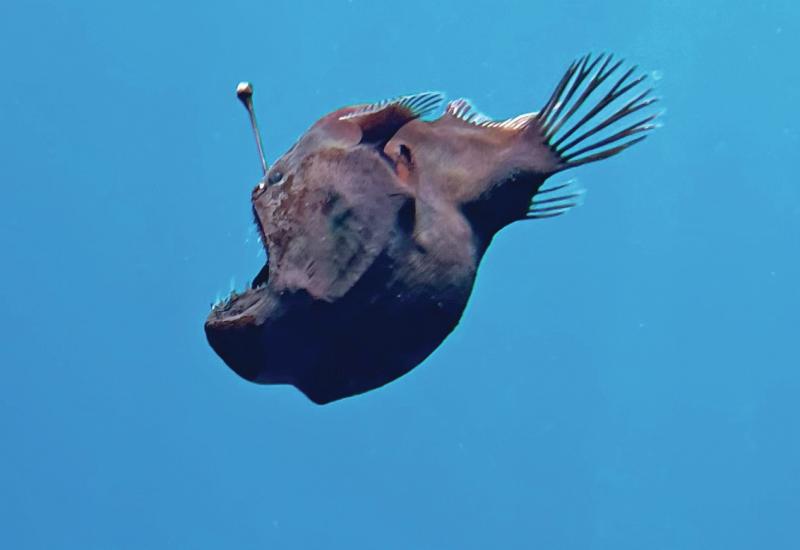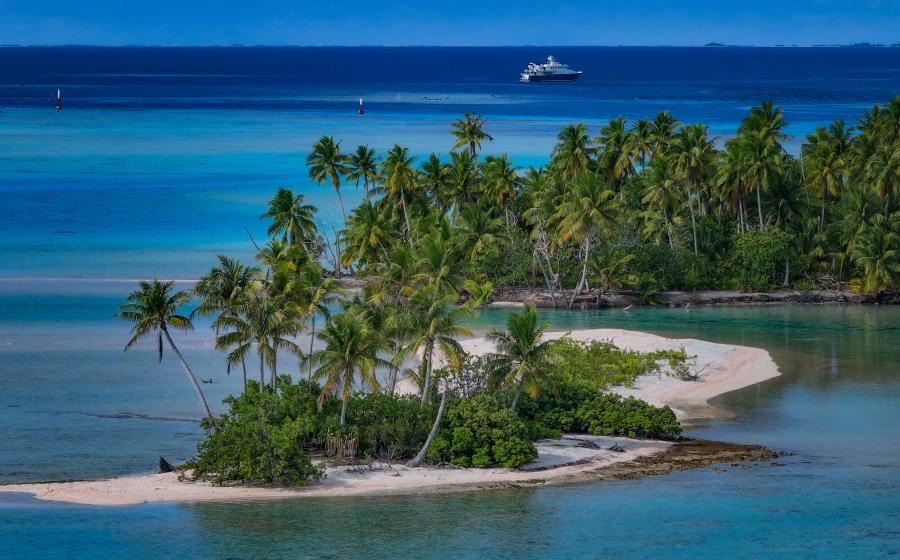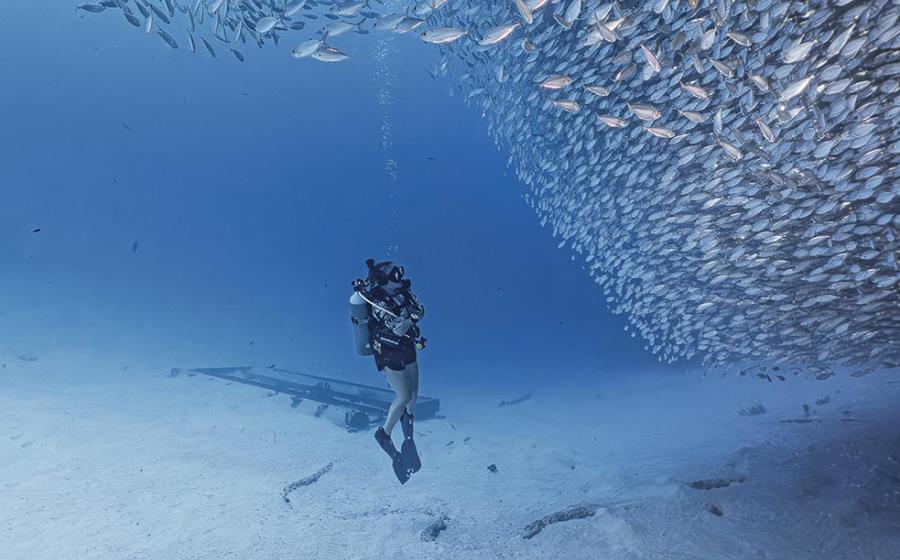UM Rosenstiel School Scientists Launch Rescue-A-Reef Initiative
MIAMI – Do you want to help rescue Florida’s coral reefs? Through the new UM Rosenstiel School Rescue-A-Reef research program, citizens are invited to join scientists underwater to help restore coral reefs.
The citizen science program takes scuba divers or snorkelers to coral nurseries restoration sites near Miami, Fla., where they conduct nursery maintenance and assist in planting nursery corals at natural reef sites. In addition, participants will have access to an online virtual expedition, which provides in-depth information about the coral nursery and restoration process.
“Instead of just watching our coral reefs decline, we have an opportunity to contribute to their persistence and recovery,” said Diego Lirman, associate professor of marine biology and ecology, and lead scientist of the Rescue-a-Reef Initiative. “The community can become part of the solution through our Rescue-A-Reef coral reef restoration program.”
The Rescue-A-Reef Initiative is a collaboration between the UM Rosenstiel School Benthic Ecology Lab and the RJ Dunlap Marine Conservation Program. The first UM Rosenstiel School underwater coral nursery was established by Lirman in 2007 in Miami-Dade County, and expanded to include two additional nurseries in 2009 and 2013. Nursery-grown colonies produce a sustainable stock of corals, which can then be transplanted to degraded reefs without the need for continuous collections from wild populations.
The Rescue-a-Reef Initiative is modeled after the Shark Citizen Science Program, led by UM Rosenstiel Research Assistant Professor Neil Hammerschlag. Citizen Science is an opportunity for nonprofessional scientists to be involved in scientific inquiry through proactive participation with scientists working on real-time problems relating to their research. Participation involves scientifically sound practices and measurable outcomes.
“The program provides a unique opportunity for someone to be a marine biologist for a day to assistant with research that supports the health of our coral reefs,” said Hammerschlag, director of the RJ Dunlap Marine Conservation Program.
Coral reefs provide critical habitat to a countless number of plants and animals, and are under threat by climate change, destructive fishing techniques, pollution, disease and coral bleaching. For more information on the Rescue-A-Reef Initiative, visit their website and to join a trip, email: [email protected]
For those who want to help coral reefs, but prefer to stay dry, donations can be made to support the coral nurseries, as well as reef outplanting and maintenance. Donations can be made online at www.RescueAreef.com, or by contacting Caroline Hammerschlag at 305-421-4207.
About the University of Miami’s Rosenstiel School
The University of Miami is one of the largest private research institution in the southeastern United States. The University’s mission is to provide quality education, attract and retain outstanding students, support the faculty and their research, and build an endowment for University initiatives. Founded in the 1940s, the Rosenstiel School of Marine & Atmospheric Science has grown into one of the world’s premier marine and atmospheric research institutions. Offering dynamic interdisciplinary academics, the Rosenstiel School is dedicated to helping communities to better understand the planet, participating in the establishment of environmental policies, and aiding in the improvement of society and quality of life. For more information, please visit www.rsmas.miami.edu.

Christine ShepardCorals are tied to "trees" with plastic cable ties.
MIAMI – Do you want to help rescue Florida’s coral reefs? Through the new UM Rosenstiel School Rescue-A-Reef research program, citizens are invited to join scientists underwater to help restore coral reefs.
The citizen science program takes scuba divers or snorkelers to coral nurseries restoration sites near Miami, Fla., where they conduct nursery maintenance and assist in planting nursery corals at natural reef sites. In addition, participants will have access to an online virtual expedition, which provides in-depth information about the coral nursery and restoration process.
“Instead of just watching our coral reefs decline, we have an opportunity to contribute to their persistence and recovery,” said Diego Lirman, associate professor of marine biology and ecology, and lead scientist of the Rescue-a-Reef Initiative. “The community can become part of the solution through our Rescue-A-Reef coral reef restoration program.”
The Rescue-A-Reef Initiative is a collaboration between the UM Rosenstiel School Benthic Ecology Lab and the RJ Dunlap Marine Conservation Program. The first UM Rosenstiel School underwater coral nursery was established by Lirman in 2007 in Miami-Dade County, and expanded to include two additional nurseries in 2009 and 2013. Nursery-grown colonies produce a sustainable stock of corals, which can then be transplanted to degraded reefs without the need for continuous collections from wild populations.
The Rescue-a-Reef Initiative is modeled after the Shark Citizen Science Program, led by UM Rosenstiel Research Assistant Professor Neil Hammerschlag. Citizen Science is an opportunity for nonprofessional scientists to be involved in scientific inquiry through proactive participation with scientists working on real-time problems relating to their research. Participation involves scientifically sound practices and measurable outcomes.

Christine ShepardAn example of a coral "planted" during the coral restoration program.
“The program provides a unique opportunity for someone to be a marine biologist for a day to assistant with research that supports the health of our coral reefs,” said Hammerschlag, director of the RJ Dunlap Marine Conservation Program.
Coral reefs provide critical habitat to a countless number of plants and animals, and are under threat by climate change, destructive fishing techniques, pollution, disease and coral bleaching. For more information on the Rescue-A-Reef Initiative, visit their website and to join a trip, email: [email protected]
For those who want to help coral reefs, but prefer to stay dry, donations can be made to support the coral nurseries, as well as reef outplanting and maintenance. Donations can be made online at www.RescueAreef.com, or by contacting Caroline Hammerschlag at 305-421-4207.

Christine ShepardPeople can become citizen scientists.
About the University of Miami’s Rosenstiel School
The University of Miami is one of the largest private research institution in the southeastern United States. The University’s mission is to provide quality education, attract and retain outstanding students, support the faculty and their research, and build an endowment for University initiatives. Founded in the 1940s, the Rosenstiel School of Marine & Atmospheric Science has grown into one of the world’s premier marine and atmospheric research institutions. Offering dynamic interdisciplinary academics, the Rosenstiel School is dedicated to helping communities to better understand the planet, participating in the establishment of environmental policies, and aiding in the improvement of society and quality of life. For more information, please visit www.rsmas.miami.edu.










